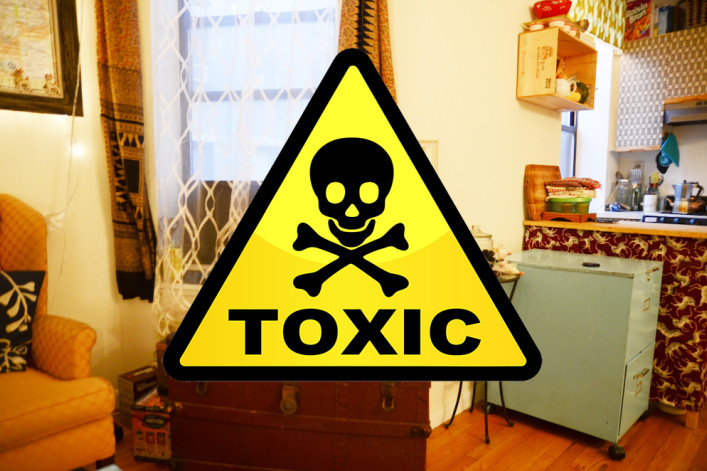Help! My neighbor is poisoning me through the vents

We often receive emails from readers asking for help in navigating their own real estate crises. In Realty Bites, we try to get them answers.
THE PROBLEM:
We've all had to deal with pungent neighbors from time to time—the smell of a fried fish dinner here, a wet dog in the hallway there—but we recently heard from a co-op shareholder with next-level fume issues.
"After suffering from tremors, nausea, stinging in the eyes, and headaches, I did an air quality test in my apartment," she writes. "It found that my apartment was loaded with ethanol, which according to my research, would explain all my symptoms."
Moreover, she notes, "it is suspected that the neighbor below is pushing the substance to my apartment through the vents." Unclear if this is an intentional move or not on the part of the neighbor, but either way, it doesn't make for a good (or healthy) living situation. Apparently, 311 advised the reader that they can only test for carbon monoxide and recommended she sell the apartment. But surely there's another solution?
THE SOLUTION:
While it may take some work to find—and fix—the source of your apartment's ethanol problem, our experts say, your building is legally obligated to help you out, and will very likely end up footing the bill.
If you haven't already, now's the time to send a formal, written complaint detailing your concerns to the building's managing agent, says Dean Roberts, a real estate attorney at Norris McLaughlin & Marcus who works with co-op and condo boards. "Vents are deemed to be a 'common element,'" he explains—i.e. a part of the building that the co-op board, not individual residents, is responsible for—and "it's the duty of the managing agent to at least inspect and see what the issue is, if anything."
In fact, it's very likely you're not the only resident affected by whatever's going on in your building's ventilation system, says Chris Lussier, a residential sales representative with Duct & Vent Cleaning of America. "If everyone is sharing the same duct port, you're going to have issues with contamination from one apartment to the next," he explains. Rather than a basic cleaning, the building will likely need to bring someone in to repair and properly seal connections between the ducts. "If it's coming from someone else's unit into yours," he says, "trying to fix the problem in your individual apartment won't solve the issue of where it's coming from." Companies like Air Duct NYC will charge an $89 flat fee to come in and diagnose potential problems in your building's vents.
If the problem comes from the building at large, the management is in charge of paying, and if your neighbor is, in fact, contaminating your building's air, the co-op can compel that shareholder to cover the cost of repairs. While you do have legal recourse if your neighbor has been intentionally polluting your apartment—you can complain to the management that they constitute a "nuisance," or start your own litigation, says Roberts—since it's the building's job to handle these repairs, it's likely not worth the hassle.
And if you do just throw up your hands and decide to sell, a word of warning: you'll want to disclose the problem to potential buyers, lest you run into any potential liability issues down the road. After all, you wouldn't inflict the same health problems on an unwitting buyer as your neighbor has on you, right?
Related:
Keeping your place stink-free in the smelliest time of year
Ask an expert: can I break my lease because my apartment stinks (literally)?
Ask an expert: why do I always smell what my downstairs neighbor is cooking for dinner?
5 momentous NYC legal battles that changed what it means to own an apartment
How do I kick my deadbeat brother out of the co-op I own with our dad?






















